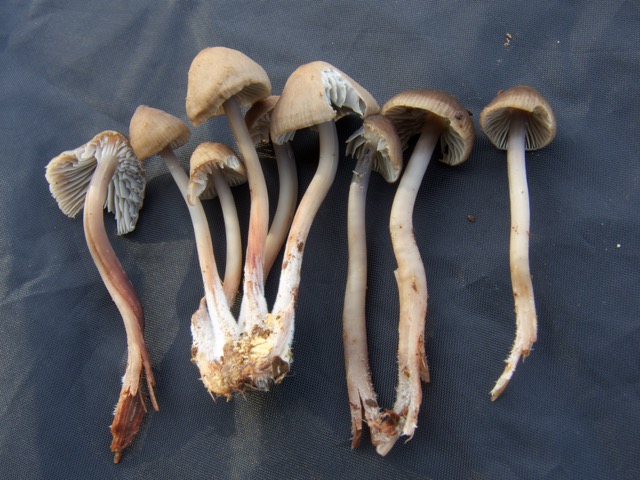
The genome of Mycena maculata was sequenced as part of the Mycenaceae sequencing project and the overarching JGI 1000 Fungal Genomes project “Deep Sequencing of Ecologically-relevant Dikarya“ (CSP 1974).This project will examine members of the Mycena genus to evaluate the genomic basis of their different nutritional modes.
The reddish-spotted bonnet, Mycena
maculata
Mycena maculata is a member of the
Mycena section (Maas Geesteranus 1988, Aronsen and
Læssøe 2016). It grows on coniferous wood as well as
hardwood as its close relative, M. galericulata, but is
much less common. It can be identified by its reddish colours on
its pileus and stipe, and the reddish spots that normally develops
on the fruitbodies with age. As with M.
galericulata, we also expect the likewise broad generalist
M. maculata to contain a large and elaborate set
of enzymes attacking lignin/cellulose polymers with different
chemical structures (Floudas et al. 2012). However, M.
maculata differs from M. galericuata by
being strongly bioluminiscent (Treu and Agerer 1990). Several other
Mycena species sequenced (such as M.
epipterygia and M. haematopus) share
this trait with M. maculata despite being more
distantly related to it than the nonluminescent M.
galericulata. A two-step enzymatic mechanism behind
bioluminescence ("luciferin-luciferase") identical across all
bioluminescent fungal taxa has been described (Oliveira et al.
2012). From the genomes of these two species, we hope to see
whether the function of genetic regions coding for the
luciferin-luciferase enzymes has been lost in M.
galericulata, or if the genes are just not usually
expressed.
This genome was derived from dikaryotic (diploid) pure culture on
MEA agar with ampicilin and benomyl and should be free of
xenobiotic contaminations. Researchers who wish to use data from
unpublished Mycena genomes for publication are
respectfully required to contact the PI and JGI to avoid potential
conflicts on data use and coordinate other publications with the
Mycena master paper(s).
References
Aronsen, A.; Læssøe, T.: The genus Mycena
s.l. in The Fungi of Northern Europe, vol. 5. Copenhagen, 373 p
(2016).
Floudas, D., Binder, M., Riley, R. & Hibbett, D. e. a. The
Paleozoic Origin of Enzymatic Lignin Decomposition Reconstructed
from 31 Fungal Genomes. Science (2012).
Maas Geesteranus, R. A. Conspectus of the Mycenas of the
Northern Hemisphere. Proc. Kon. Ned. Akad. v. Wetensch. (Ser. C)
(1988).
Oliveira, A.G., Desjardin, D.E., Perry, B.A., Stevani, C.V.:
Evidence that a single bioluminescent system is shared by all known
bioluminescent fungal lineages. Photochemical &
Photobiological Sciences 11 (2): 848–852. (2012).
Treu, R, Agerer, R.:Culture characteristics of
some Mycena species. Mycotaxon 38: 279-309
(1990).
Genome Reference(s)
Harder CB, Miyauchi S, Virágh M, Kuo A, Thoen E, Andreopoulos B, Lu D, Skrede I, Drula E, Henrissat B, Morin E, Kohler A, Barry K, LaButti K, Salamov A, Lipzen A, Merényi Z, Hegedüs B, Baldrian P, Stursova M, Weitz H, Taylor A, Koriabine M, Savage E, Grigoriev IV, Nagy LG, Martin F, Kauserud H
Extreme overall mushroom genome expansion in Mycena s.s. irrespective of plant hosts or substrate specializations.
Cell Genom. 2024 Jul 10;4(7):100586. doi: 10.1016/j.xgen.2024.100586
